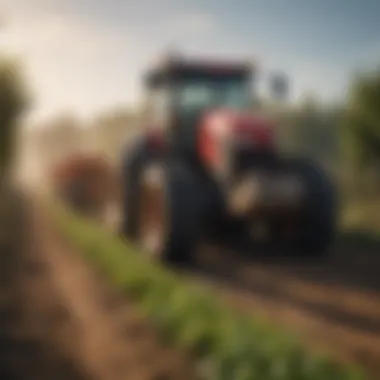Exploring Agronomy Consulting's Role in Agriculture


Intro
Agronomy consulting plays a pivotal role in the agricultural landscape, orchestrating a blend of science, practicality, and innovation. As farms face evolving challenges—like climate change, market fluctuations, and the constant pursuit of sustainability—agronomy consultants bring a wealth of knowledge and expertise to the table.
Definition and Importance
Agronomy consulting can be defined as a specialized service that provides farmers with expert advice on crop production, soil management, pest control, and overall farm efficiency. In an era where agricultural practices must adapt quickly to technological advances and environmental concerns, these consultants act not just as advisors but as strategic partners. Their insights can significantly improve yields, reduce costs, and help cater to consumer demands for sustainable practices.
Current Trends
The agricultural sector is undergoing significant transformations, with many trends shaping the future of agronomy consulting:
- Precision Agriculture: Utilizing data and technology, farmers can make informed decisions on planting, irrigation, and harvesting.
- Sustainable Practices: There’s a notable shift towards eco-friendly methods, with many consultants advocating for organic farming and integrated pest management.
- Smart Farming Tech: Innovations such as drones and sensors offer real-time data, optimizing farm operations and enhancing crop monitoring.
"Agronomy consulting is more than just helping grow plants; it's about growing a sustainable future for agriculture."
The responsibility lies not only with farmers but also with consultants to navigate these changes effectively. In doing so, they foster agricultural practices that are resilient to climate shifts while maintaining economic viability.
As we progress in this guide, we will unpack the various aspects of agronomy consulting, examining its techniques, challenges, and solutions, along with the practical tools that can empower farmers and agricultural enthusiasts alike.
Prelims to Agronomy Consulting
Agronomy consulting plays a pivotal role in modern agriculture, acting as the glue that binds scientific agricultural practices with real-world farming operations. In today's fast-paced and ever-evolving agricultural landscape, farmers face numerous challenges ranging from climate change to market fluctuations. Here, the significance of agronomy consultants shines through, as they guide farmers in making informed decisions that can significantly enhance productivity and sustainability.
Definition and Overview
At its core, agronomy consulting involves providing expertise and advice on the various aspects of farming and crop production. This encompasses the management of soil health, crop selection, pest control, and resource optimization. The consultant’s job is not merely to hand down advice; instead, it's about collaboration with farmers to tailor solutions that fit individual needs and unique circumstances. As a farmer navigates the complexities of modern agriculture, the consultant serves as a trusted advisor, leveraging their knowledge for better outcomes.
The Historical Context
The concept of agronomy consulting didn’t spring up overnight. Historically, farmers relied on anecdotal knowledge passed down through generations. It was only through the advent of agricultural science in the early 20th century that systematic agronomy began to take shape. With significant advancements in technology and research, the role of the agronomy consultant has evolved into a specialized profession. Today’s consultants are equipped with data-driven approaches to tackle long-standing challenges in agriculture, making them invaluable assets in any farming operation.
Scope of Services
The breadth of services offered by agronomy consultants can be nothing short of astounding. Typical services include:
- Soil Health Assessment: Consultants conduct thorough analyses of soil quality, structure, and nutrient content. This is vital for optimizing crop yields.
- Crop Rotation Strategies: They develop custom crop rotation plans that not only boost production but also benefit soil health.
- Integrated Pest Management: In an era of increasing pest resistance, consultants provide actionable insights and strategies to maintain healthy crops with minimal pesticide usage.
- Sustainable Practices Guidance: As sustainability takes center stage, consultants help in adopting practices that minimize environmental impact while maintaining productivity.
In addition to these, consultants might also assist in financial planning and market analysis, ensuring that the farmer's efforts are not just effective agronomically but also economically viable.
"Agronomy consulting is not just about advising; it's about implementing change for a better tomorrow."
Engaging an agronomy consultant involves more than just seeking answers; it opens the door to diverse perspectives and innovative solutions, ultimately steering the farming operation towards success. This guide will delve deeper into the multifaceted world of agronomy consulting, examining the roles, benefits, and emerging trends that are shaping the future of agriculture.
Roles of Agronomy Consultants
Agronomy consultants play a pivotal role in modern agriculture, bridging the gap between scientific expertise and practical farming applications. Their influence extends across various domains, enhancing productivity and fostering sustainable practices. Understanding their roles is essential for anyone involved in farming or agronomy-related activities. This section will explore the different facets of agronomy consulting, emphasizing its importance in transforming agricultural practices.
Expertise in Crop Management
The cornerstone of agronomy consulting is the consultant's expertise in crop management. This expertise means understanding which crops thrive best in specific soil types, climatic conditions, and regional environments. An agronomy consultant provides tailored guidance based on variables like crop rotation, planting schedules, and nutrient management.
A consultant's proficiency in crop management typically includes:


- Assessing crop life cycles and growth patterns.
- Recommending the best sowing techniques.
- Evaluating and selecting appropriate crop varieties for the conditions on hand.
When those who manage farms apply these insights, they often experience enhanced yields and improved soil health. Ultimately, effective crop management leads to more robust food production systems and greater economic resilience for farmers.
Soil Analysis and Recommendations
Soil health directly impacts crop productivity. Agronomy consultants conduct thorough soil analyses to uncover vital information about nutrient profiles, pH levels, and organic matter content. They use soil testing not merely to collect data but to formulate comprehensive recommendations that cater to specific farming needs.
Key aspects of soil analysis provided by consultants include:
- Nutrient testing: Identifying deficiencies or excesses to tailor fertilization plans.
- Physical analysis: Evaluating soil texture and structure for better crop growth.
- Microbial assessment: Understanding soil biology to bolster ecosystem services.
With sound advice based on detailed analysis, farmers can optimize their inputs and have healthier soils. This focus on soil rejuvenation contributes significantly to sustainable farming; indeed, healthy soil is the backbone of any fruitful farming operation.
Integrated Pest Management
Integrated Pest Management, or IPM, is another crucial role that agronomy consultants fulfill. This multidisciplinary approach combines biological, cultural, mechanical, and chemical tools for effectively managing pests while minimizing risks to people and the environment. Agronomy consultants are well-versed in creating IPM strategies that are both practical and sustainable.
Some important components of IPM include:
- Regular pest monitoring: Assessing pest populations to determine when action is needed.
- Cultural controls: Modifying farming practices to deter pest infestations.
- Biological control options: Utilizing natural enemies of pests to keep populations in check.
An effective IPM strategy minimizes pesticide use, which not only curtails costs associated with chemicals but also supports ecological balance in the farming environment. This proactive approach leads to healthier crops, reduced pest damage, and improved farmer morale as they work within sustainable frameworks.
The role of agronomy consultants in implementing Integrated Pest Management cannot be overstated; their insights lead to healthier ecosystems and more productive farms.
Benefits of Agronomy Consulting
Agronomy consulting offers a multitude of advantages to farmers and agricultural oragnizations alike. It’s not just about growing crops; it's about growing efficiently, sustainably, and profitably. By harnessing the expertise of agronomy consultants, individuals involved in farming can attain significant benefits that translate directly into improved yields, sustainable practices, and lower costs. Let’s break down some of the most pertinent advantages.
Enhanced Agricultural Productivity
One of the most compelling benefits agronomy consulting brings to the table is enhanced agricultural productivity. Consultants analyze a myriad of factors that can affect crop growth, including soil health, water availability, and pest pressures. By identifying the specific needs of a farm and tailoring recommendations accordingly, consultants can help farmers optimize their practices.
Consider a scenario where a consultant realizes that a farmer's yield is subpar due to nutrient deficiencies in the soil. They might recommend targeted fertilization strategies or specific crop rotations. These adjustments can result in increased yields, making a tangible impact on a farm’s profitability. The use of precision agriculture tools further empowers farmers to apply resources in a more efficient manner, limiting waste and maximizing output.
“The best way to predict the future is to create it.” - Peter Drucker
This quote rings true in agriculture; with informed decision-making, farmers can shape their outcomes.
Sustainable Farming Practices
Sustainability has become more than just a buzzword; it’s a necessity in today’s agricultural realm. Agronomy consultants are pivotal in guiding farms towards sustainable practices that protect the environment while still meeting production demands. They can provide insights into integrated pest management, crop diversification, and the judicious use of resources.
For instance, by encouraging reduced tillage practices, consultants can help combat erosion and enhance soil structure. Using cover crops as part of a rotation not only improves soil health but also contributes to biodiversity within the ecosystem. Providing farmers with strategies to minimize environmental impact can yield long-term benefits, not just for the operations themselves but for the planet as a whole.
Sustainability isn’t just good for the earth; it's also good for business. Consumers today are increasingly aware of where their food comes from and are often willing to pay a premium for sustainable products, opening new avenues for profitability.
Cost-Effectiveness
In an industry where margins can be razor-thin, cost-effectiveness is an area where agronomy consultants truly shine. By providing specialized knowledge and strategies, they enable farmers to make smarter decisions regarding resource allocation. For example, an agronomy consultant might recommend a specific irrigation system that not only conserves water but also reduces energy costs in the long run.
In addition, consultants can identify wasteful practices or inputs that may not be yielding returns. This can lead to significant savings over time. With their finger on the pulse of the latest technologies, agronomy consultants can guide farmers through investments in tools that provide the greatest return on investment.
In summary, the advantages of agronomy consulting become evident when examining the impacts on productivity, sustainability, and cost. Each benefit doesn't just stand alone; they interlink, creating a pathway for farmers to thrive within an ever-evolving industry landscape. Collaboration with agronomy consultants ultimately leads to a more informed and resourceful agricultural community.


Choosing the Right Agronomy Consultant
Selecting the right agronomy consultant can be a puzzling process for farmers and agricultural operations. The benefits associated with making an informed choice are tremendous. An adept consultant not only guides you through the nuances of crop management but also helps in navigating the shifting landscapes posed by modern agriculture. The importance of this decision cannot be understated; it can have repercussions on yield, sustainability, and overall farm profitability.
Evaluating Credentials and Experience
A consultant's credentials and experience are foundational to their effectiveness. First and foremost, check their educational background. Many consultants come equipped with degrees in agronomy, agricultural science, or a related field. But, it doesn't stop there. Actual hands-on experience often speaks louder than diplomas on a wall. Look for a consultant who has accumulated years of working directly with farmers.
"Experience is the best teacher, but the test results are among the worst."
This means that while book knowledge is essential, having a consultant who knows the land and hesits its challenges is invaluable. Request case studies or testimonials from previous clients. This helps in establishing trust. If their past clients saw real improvements, chances are you might too.
Specialization in Relevant Areas
The agricultural landscape is ever-evolving, thus specialization has become increasingly crucial. Just as one wouldn't seek a heart surgeon for a foot injury, finding a consultant who specializes in your specific agricultural needs is essential. Perhaps you're a farmer focused on grain crops, or maybe you grow specialty vegetables. Once you pinpoint your needs, search for consultants who have track records relevant to those areas.
- Common Specializations:
- Organic farming
- Precision agriculture
- Soil management
- Pest control strategies
It is also wise to inquire about the consultant's approach to new technologies like regenerative practices or digital tools. They should be well-versed in how technology can support sustainable practices in your operations.
Communication and Collaboration Skills
Once the qualifications and specialties seem a match, the soft skills cannot be ignored. Effective communication and collaborative spirit are paramount. A consultant with great ideas is of little use if they cannot convey them clearly or are not willing to work alongside you as a partner.
When assessing this aspect, consider having an initial conversation with potential consultants. Pose questions regarding their workflow and how they plan to collaborate with you. Pay attention to how they listen—do they ask clarifying questions? This can indicate whether they value your input, which is critical for a successful consultant-farmer partnership.
To sum it up, the journey of choosing the right agronomy consultant involves thorough evaluation of experience, specialization, and interpersonal skills. Each of these elements plays a pivotal role in ensuring that you find a consultant who aligns with your specific farm goals and practices. This alignment is vital for not only achieving immediate objectives but also for fostering a long-term relationship that nurtures both agricultural growth and sustainability.
Emerging Trends in Agronomy Consulting
Agronomy consulting is witnessing a seismic shift, molded by advances in technology, evolving farmer needs, and the pressing challenges posed by climate change. Staying relevant requires consultants to adapt to these emerging trends, as they hold the key to shaping the future of agricultural practices and sustainability. It's not just about providing advice anymore; it’s about harnessing innovation to drive productivity and environmental stewardship. This section highlights some of the significant trends shaping agronomy consulting today.
Digital Technologies and Precision Agriculture
The dawn of digital technologies is reshaping how agronomy consultants interact with farms. Precision agriculture, powered by tools like drones, satellite imagery, and soil sensors, allows for exhaustive monitoring of crops and soil conditions. These technologies enable consultants to gather real-time data to make informed decisions.
- Drones: They provide aerial views of large farmlands, helping with tasks like crop health assessment and yield estimation.
- Soil Sensors: These gizmos measure variables such as moisture and pH levels, giving vital information that influences crop management decisions.
By using these tools, consultants can tailor recommendations specific to the farm’s needs, maximizing crop yields while reducing input costs. This customization is not merely beneficial; it optimizes resource use, an important factor for sustainability.
With digital technologies at their fingertips, agronomy consultants are effectively bridging the gap between science and practical application on the farm, ensuring that farmers are equipped for success in a rapidly changing landscape.
Data-Driven Decision Making
In the shadows of these technological advances lies the immense power of data. The information gleaned from various sources—from weather forecasts to historical crop performance—is driving a new era of decision-making in agronomy consulting.
Now, consultants rely heavily on data analytics to guide their strategies. This shift toward data-driven insights involves:
- Analyzing Historical Trends: Understanding past performance helps in projecting future outcomes, guiding farmers in choosing the right crops and planting schedules.
- Risk Assessment: By examining weather patterns and market trends, consultants can help farmers mitigate risks associated with climate variability.
- Tailored Recommendations: With mountains of data available, each action can be customized, allowing consultants to recommend particular fertilizer types or irrigation schedules based on detailed soil profiles.
A data-centric approach not only enhances productivity but also paves the way for more sustainable practices by minimizing waste.
Climate Adaptation Strategies


As climate change continues to rear its head, adapting agricultural practices is paramount. Agronomy consultants are at the tip of the spear, developing strategies that help farmers adjust to changing weather conditions and environmental challenges.
Some of the strategies include:
- Diverse Crop Rotations: Encouraging a mix of crops that can endure varying climatic conditions helps in maintaining soil health and countering pests.
- Water Management Techniques: Implementing advanced irrigation methods, such as drip irrigation, conserves water while ensuring crops receive enough moisture.
- Soil Health Improvements: Focusing on soil conditioning techniques that prevent erosion and nutrient loss leads to resilient agricultural practices.
Considered through the lens of agronomy consulting, these adaptations not only safeguard current yields but also help ensure that agriculture will continue to thrive in the face of likely future environmental upheavals.
The Future of Agronomy Consulting
The landscape of agriculture is shifting under the weight of global challenges such as climate change, population growth, and evolving consumer demands. Consequently, the role of agronomy consulting is more pivotal now than ever. As we venture into the future, agronomy consultants will need to adapt to maintain their relevance and effectiveness within the sector. This section explores critical elements that indicate the trajectory of agronomy consulting, how consultants can respond proactively to emerging issues, and the benefits of continuous collaboration and development.
Responding to Global Agricultural Challenges
The world faces daunting agricultural challenges. From unpredictable weather patterns to soil degradation, agronomy consultants must step up to these demands. By implementing innovative strategies, they can help farms adapt their practices to these changing conditions. For instance, consultants can promote resource-efficient farming techniques that conserve water and optimize inputs.
- Practical Implementation: Agronomy consultants should focus on strategies like crop rotation and diversification for resilience against pests and climatic shifts.
- Research Collaboration: Engaging with academic institutions and research bodies to leverage studies can provide their clients with cutting-edge insights into sustainable practices.
As one agronomy expert noted, "Consultants must be the bridge between traditional methods and modern science, guiding farmers through uncertainty."
Consequently, the future of agronomy consulting hinges on the ability to not only recognize these challenges but also devise tailored solutions that meet diverse farming needs across various regions.
Strengthening Collaboration with Farmers
Another vital aspect of the future of agronomy consulting lies in enhancing collaboration. Effective communication and partnership with farmers will ensure that consultants can implement effective strategies on the ground. The relationship must transcend simple advice-giving; it should evolve into a partnership where both parties contribute towards common goals like sustainability and productivity.
- Workshops and Training: Regular workshops and on-field training sessions can further strengthen this bond, allowing farmers to share experiences and learn new techniques directly from the consultant's expertise.
- Feedback Mechanisms: Establishing structured feedback loops can help consultants understand the real-world implications of their recommendations, leading to better strategies tailored to specific farm situations.
This kind of collaboration not only fosters trust but also empowers farmers to make informed decisions, ultimately leading to improved agricultural outcomes.
Continual Professional Development
Lastly, continual professional development is crucial for agronomy consultants. The agricultural sector is rapidly evolving. New technologies, policies, and practices emerge constantly, and consultants must stay up-to-date to remain useful. Investing in professional growth not only enhances a consultant's knowledge base but also their credibility among clients.
- Online Courses and Workshops: Utilizing online platforms can enable consultants to learn about the latest advancements in agronomy without interrupting their operational duties.
- Networking Opportunities: Joining professional organizations or attending industry conferences allows consultants to connect with peers and share valuable insights concerning best practices.
The future of agronomy consulting is promising, provided that consultants commit to lifelong learning and adaptability in their practices. Keeping these dynamics in mind ensures that they can effectively guide the agricultural industry into a more sustainable and productive future.
Case Studies in Agronomy Consulting
Case studies in agronomy consulting play a pivotal role in demonstrating the practical applications of agronomy principles and techniques. By sharing real-world examples, these case studies provide insights into successful strategies that have transformed agricultural practices and outcomes. They shed light on the unique challenges faced by farmers and how expert consultants navigated these challenges. Understanding these cases not only offers valuable lessons but also inspires confidence in potential clients seeking agronomy consultants. They can witness firsthand the tangible benefits of agronomy consulting, promoting informed decision-making.
Successful Crop Management Projects
One notable example of a successful crop management project can be found in the Midwest region of the United States. A large corn farm faced declining yields over several consecutive seasons, prompting the owner to engage an agronomy consultant. Through thorough soil testing and crop rotation planning, the consultant identified nutrient deficiencies and recommended diverse cover crops aimed at restoring soil health.
The implementation of these proposed changes resulted in a remarkable increase in corn yields, nearly doubling output within a year. Moreover, the farm observed improved soil structure and moisture retention, proving that strategic management backed by expert insight can yield fruitful results. This case highlights the importance of tailored crop management solutions specific to farm needs.
Impact of Soil Improvement Strategies
Soil health is often an overlooked aspect of agriculture, yet it's fundamental to sustainable farming. A case study from a vineyard in California exemplifies the significant impact of soil improvement strategies on crop health and productivity. This vineyard had struggled with soil erosion and poor nutrient availability.
Engaging a consultant, they focused on revitalizing the soil through organic matter incorporation and implementing a no-till farming approach. These strategies not only reduced erosion but also increased beneficial microorganisms in the soil. In the end, the vineyard enjoyed an enhanced grape quality and a healthier ecosystem, demonstrating how soil improvement carries benefits that ripple throughout the entire agricultural operation.
Pest Control Success Stories
Pest management is yet another area where agronomy consultants showcase their expertise. A case in Florida involved a citrus grove suffering from severe pest infestations, threatening the crop's viability. The grove owner was hesitant at first, leaning towards conventional pesticide usage without recognizing the long-term impacts on the ecosystem.
Here, the agronomy consultant intervened with an integrated pest management strategy. They utilized biological controls and natural repellents, aiming to maintain pest populations at manageable levels without relying heavily on chemicals. After several seasons, the grove showed a resurgence of healthy citrus trees, increasing fruit production dramatically. The natural balance restored in the ecosystem served as a testament to sustainable pest management practices.



